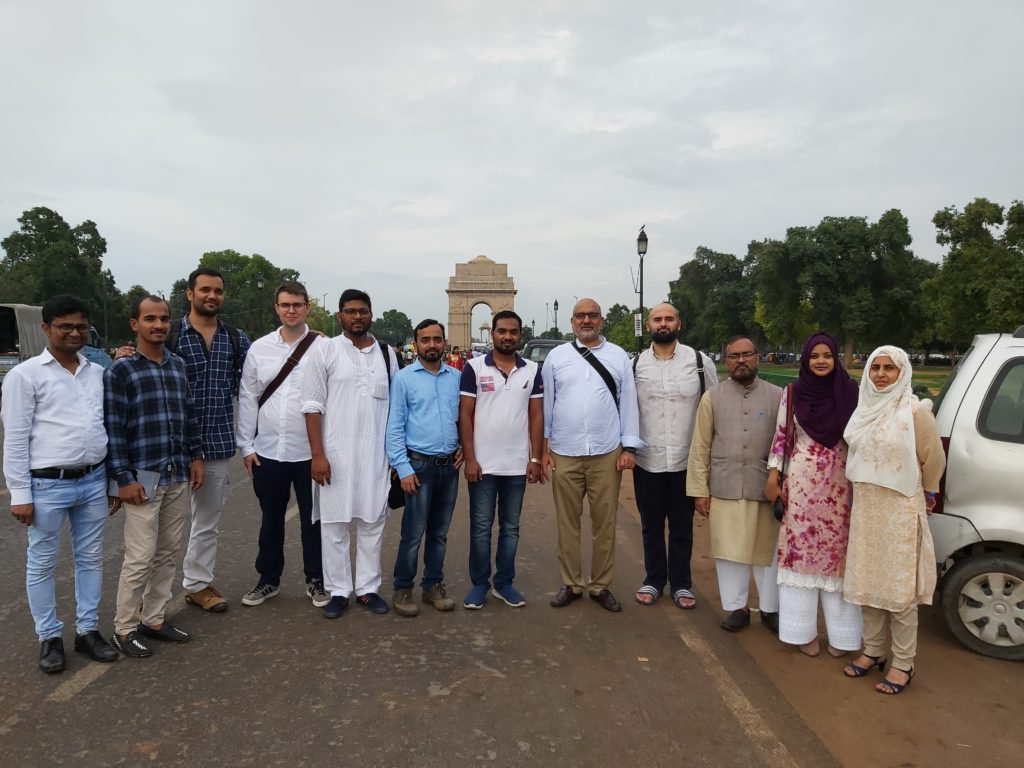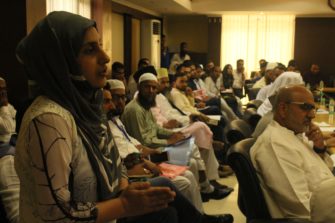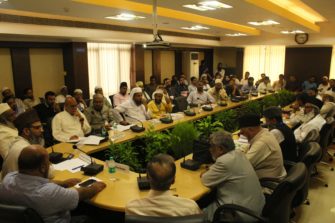
The public event that opened the Madrasa Discourses Summer Intensive in July 2019 was intended to introduce the Muslim community in India to the Madrasa Discourses project. It was attended by a large number of senior clerics and madrasa graduates, and became the focus of attention for a segment of the Muslim community in India. One of the questions that emerged in the debates during and after the public event was why it was necessary for Madrasa graduates to study modern science and philosophy. Some present at the event argued that Madrasas are meant to preserve traditional religious learning, and therefore burdening madrasa students with such disciplines as philosophy is both unnecessary and undesirable. Others claimed that it is not the responsibility of Madrasa graduates to provide rational explanations for religious beliefs. One of the participants at the event went so far as to say that religion has nothing at all to say on human problems in this world. Rather, it is entirely oriented towards the other world. The implication of this claim was that there is no need for the religious scholars to study any disciplines pertaining to our physical and social world.
During the discussion session, participants seemed somewhat willing to engage with the questions of the physical sciences. However, most expressed the view that social sciences and philosophy were not to be taken seriously because of the belief that these disciplines are not as accurate as physical sciences, are more speculative, and are largely based in a “western context,” having nothing to do with other societies. This entire discussion felt overwhelmingly ahistorical and mistaken, however, because the Islamic tradition of which these scholars claim to be preservers is one which has been nothing if not deeply philosophical.
These issues, moreover, have practical implications for the everyday lives of Muslims. A glance at the lived experiences of Muslims in the modern world reveals that in their everyday lives, they are confronted with practice-based problems, such as where to invest their money so as to keep the investments both safe and halal, whether it is acceptable in Islam to buy products on EMI (Equated Monthly Installments) with interest, what kind of dress to wear, what kind of jobs to take, or how to study those aspects of physical and social sciences that contradict the age-old practices and beliefs deemed Islamic by Muslim societies and communities. Another kind of dilemma that Muslims encounter is one of an intellectual and philosophical nature. For example, a teacher of biology may teach evolution in the class and then be lectured by an imam during Friday khutbah on how modern scientific ideas such as evolution are contrary to the Qur’an.
Practice-based and philosophical dilemmas may seem very different, but they both hinge on how Muslims cope with a rapidly changing world and how effectively and promptly they translate their religious tradition across cosmologies so as to reconcile their lived experiences with their religion. Madrasa Discourses attempts to familiarize Madrasa graduates with some of the questions that modern philosophy and science have raised for the Islamic tradition as it has developed through the centuries.
No Intellectual Enquiry without a Robust Epistemology
Over the past two years in the Madrasa Discourses program, we have learned to think about philosophy as “thinking about thinking.” Practitioners of any intellectual discipline, be it physics or history, deal with questions concerning what counts as valid knowledge and what theories and methods are acceptable for producing new knowledge. As a result of reflection by practitioners of those disciplines, theories change and new theories and methods emerge. Such self-reflection provides a discipline with its epistemological grounding. In the absence of a deep understanding of epistemological problems and issues in one’s discipline, there can be no agreement on what constitutes valid knowledge. This makes it is easier for an opinion backed by power to reign as authoritative on the one hand, and on the other, for each individual to form their own views on each matter without a learned consensus of any kind between different members of an intellectual or faith community. Both these situations are counterproductive. Some of us feel the presence of both these problems in Indian higher education. The issue is particularly rife in departments of Islamic studies. These departments operate largely in isolation from other disciplines in both the physical and social sciences and in a complete epistemological vacuum. For Islamic studies to develop as an academic discipline worthy of the name, it has to seriously engage with the new picture of the world that is emerging as a result of more recent philosophical and scientific developments in other disciplines so that it may add to, contest, or problematise the conclusions reached in other disciplines on firm epistemological and methodological grounds.
Virtually absent in Islamic studies is any discussion of epistemology and methodology. Researchers can make unexamined claims about physical and social phenomena irrespective of actual status of knowledge and research about those phenomena in their concerned disciplines. For example, on page 92 in his 1992 book, Islam ka Nazariya-i-jins (The Idea of Gender in Islam)[1], a senior professor in the department of Sunni theology in Aligarh Muslim University, Sultan Ahmed Islahi, extensively quotes jurist ibn Qayyim (d. 1350) on male and female sexuality to defend polygamy, without any hint that modern scientific knowledge on sex and sexuality has changed beyond recognition since the time of ibn Qayyim.
Historical Relation between Philosophy and Religion

Philosophy emerged in the ancient world amongst those few who tried to explain natural phenomena using rational explanations. The early philosophers indeed were a rare species because in an era when most people attributed the shining of the sun to the sun god, the falling of rain to the rain god, the thunder to the thunder god, and harvest to the harvest god or goddesses, it was the philosophers who thought that there ought to be rational explanations for what causes these natural phenomena. Philosophy, however, came to be the study of much more than just the natural world. Because philosophers discussed questions related to all areas of inquiry, philosophy gradually became the fountainhead of all human knowledge in the ancient world. Philosophers pondered human society, along with politics, and the ethical principles that ought to guide the organization of both. Most importantly, however, were their discussions of what constitutes valid knowledge in a given field of inquiry. Theories about the nature of reality and how to go about accumulating valid knowledge of it became foundational for all academic disciplines and continue to be important today.
One of the most interesting developments from the point of view of a student of Islamic Studies is that many important philosophers declared that belief in several gods, spirits, and/or genies was superstitious. Philosophers instead proclaimed the existence of one God. Although the God conceived of by Plato, Aristotle, and their successors was dissimilar to the God of monotheistic religious traditions, in many ways Greek philosophy prepared the ground for the later success of those traditions.
Christians, Jews, and Muslims believe in a personal God. Their God intervenes in human history and listens to the prayers of believers. The God of the philosophers, on the other hand, could only know universals, and did not directly intervene in history or create the world. Nonetheless, theologians of monotheistic traditions borrowed the dialectic method of the Greeks to provide rational justifications for the God revealed to them in their religious texts. Therefore, all scholars, whether the philosophers or those opposed to them, wrote in the shared language of the dialectic method, and used syllogistic forms of argument borrowed from the Greeks.
Resolving the Crisis through the Idea of Historical Contingency
In the Muslim circles, we often hear vehement rejection of tasawwuf (Islamic mysticism), Kalam (theology), and falsafa (philosophy) as what are often dubbed “decadent” parts of the Islamic tradition. A return to the primary sources—the Qur’an and Hadith, and according to some positions, only the Qur’an—unmediated by any kind of philosophy, is advocated with quite some vigour. The standard claim today that all the answers are available in the Qur’an seems to ignore the fact that one’s presumptions and biases often lead to divergent readings of the Qur’an. The response by some people when concerns about different interpretations are raised is to claim that their opponents are “misguided,” “biased,” or “distorting the meaning of the Qur’an.”
In cases where the pronouncements made by earlier authors seem contrary to what appears to be just, fair, or sensible to today’s scholars, it is often argued that they were simply misreading the Qur’an and that today’s Muslims have somehow reached the “right readings.” These claims are made by several actors, but are particularly visible in cases of authors who write on science and the Qur’an. Verses on scientific subjects are said to be unintelligible to the older generations of Muslims and somehow accessible to their present readers: “A reading of old commentaries on the Qur’an, however knowledgeable their authors may have been in their day, bears solemn witness to a total inability to grasp the depth of meaning in such verses” (Dr. Maurice Bucaille, The Quran and Modern Science). Claims such as these do not recognize the contingent nature of all readings of the Qur’an. For example, Tooba Fahad, in her article “Human Embryology, The Holy Quran and Modern Science,” published in 2018 in the Journal Islamic Research Annual, (pp 46-55) claims that the three (veils of) darkness mentioned in the Quran 39:6 “may refer to the anterior abdominal wall, the uterine wall, and the amniochorionic membrane.” She marvels at the accuracy of Quranic information about human embryology long before modern technology made it possible to observe them. That earlier generations of Muslims read and understood these verses differently is either ignored or explained away as their inability to understand the right meaning.
What are known as physical sciences today were studied in the medieval period as a part of philosophy. Therefore, some modern Muslims claim that earlier readers of the Qur’an were simply wrong in their understanding of religious texts because they studied too much philosophy. This impacted their reading of the Qur’an and led them to incorrect conclusions. However, as seen in the above examples, modern readers are reading modern scientific discoveries into the Qur’an, unmindful of the fact that scientific theories, and the philosophical claims that support them, change over time. Some Muslims today attempt to read modern scientific discoveries into the Qur’an to provide evidence of its divine origin, while criticizing earlier exegetes for doing the same. They also claim that they can, or have, overcome the problem of misreading the Qur’an by reading it directly without being influenced by the experiences, presumptions, or knowledge of their time. A sound understanding of philosophical principles involved will allow scholars to see the pitfalls that they constantly fall into.
One of the ideas that we have explored in Madrasa Discourses is contingency. The term refers to the situation of a human person within the intellectual horizon of their time. Our rejection of Aristotelian science and philosophy has become possible only in retrospect, in sync with our own intellectual horizon. All the arguments against Aristotelian philosophy and medieval science have become possible only when their inconsistencies have been made apparent by modern scientific and philosophical inquiry. Human understanding of the Qur’an is always influenced by the pervasive cosmology of a person’s time. Since we as humans have very limited intellectual horizons, any human understanding of the Qur’an is therefore at best contingent.
Another noteworthy aspect of contemporary Muslim thought generally is that even those who argue vehemently against Aristotelian philosophy and science continue to think more or less within its paradigms. This is particularly visible in case of Muslim discourse on sex and gender. Here, the ideas about the nature of male and female, including their temperament, psychology, and physiology remain deeply Aristotelian. Some scholars, such as Wahiduddin Khan, who make use of such modern terms as hormones, do so only superficially. They adjust modern terminology within an overall Aristotelian paradigm: “man and woman are born different from each other in nature” (176). This view takes man and women as two homogenous and opposite categories where the “nature” of each individual, their skills, talents, choices, likes, and dislikes, are all determined by their sex. The author describes a dubious experiment where injecting women with male hormones led them to develop male characteristics. This led him to the conclusion that male and female nature are different and that therefore their social roles are also different. Modern notions of sex and gender make a distinction between sex as biologically determined and gender as socially determined. Social roles of men and women, as the name suggests, are determined by the society and not by their biology. There is nothing in female or male biology that makes them incapable of performing social roles assigned to the opposite sex.

Furthermore, while modern Muslims have blamed Aristotelian science and philosophy for harming the religious tradition and have remained skeptical of modern sciences, they have not framed a coherent worldview of their own apart from these two, but only randomly combined ideas from the two completely different worldviews. Primarily these combinations are motivated by a desire to justify certain pre-conceptions about persons and the world, as seen in the examples above. This has given rise to innumerable tenuous permutations and combinations based on individual preferences that do not have as their ground any agreed upon basic principles. The absence of a rigorous epistemology creates blind spots that are not easily seen by scholars who are making incoherent claims.
This incoherence is largely caused by the fact that the tradition that Muslims inherited has ceased to faithfully express the lived experiences of the community in modern times, leading to a situation resembling something akin to what Thomas Kuhn, in his book The Structure of Scientific Revolutions, has identified as a “crisis” in an intellectual tradition. Dr. M Maroof Shah describes the incoherence of the combined Muslim response to modern science when he writes, “[The] conflicting nature of various interpretations of some verses which have ‘Scientific allusions’ also problematizes Muslim rationalist position, e.g.; Bin Baz and Ahmad Raza Khan wrote books against motion of earth (apparently inspired by Quran according to them), Sir Syed sees it impossible to prove either earth’s motion or its stationary nature from the Quran and Zakir Naik proves motion of earth and celestial bodies from Quran” (722).
In response to the current intellectual crisis, Muslims have adopted many new positions with respect to the Islamic tradition and modern sciences. Yet due to weak philosophical and scientific perceptiveness, adherents and authors of most of these positions remain oblivious to the inconsistencies in their thought. There is a need to have a serious discussion on epistemology in order to rebuild the Islamic tradition in a new manner that is robust and coherent on the one hand, and on the other, is flexible enough to adapt to changing circumstances that future generations are bound to encounter.
[1] Sultan Ahmad Islahi, Islam ka Nazariya-i-jins (Aligarh: Idara Ilm-o-Adab,1992)

